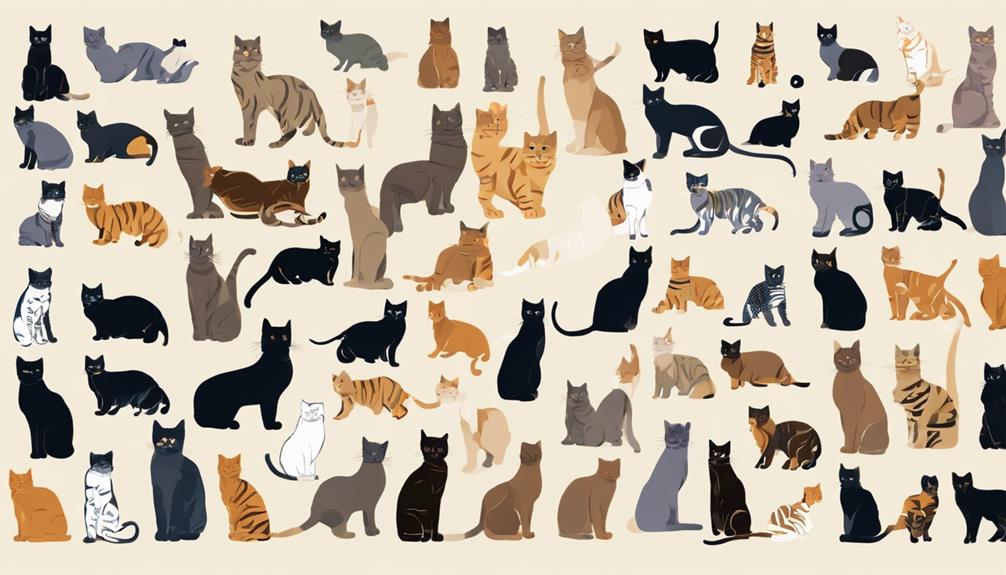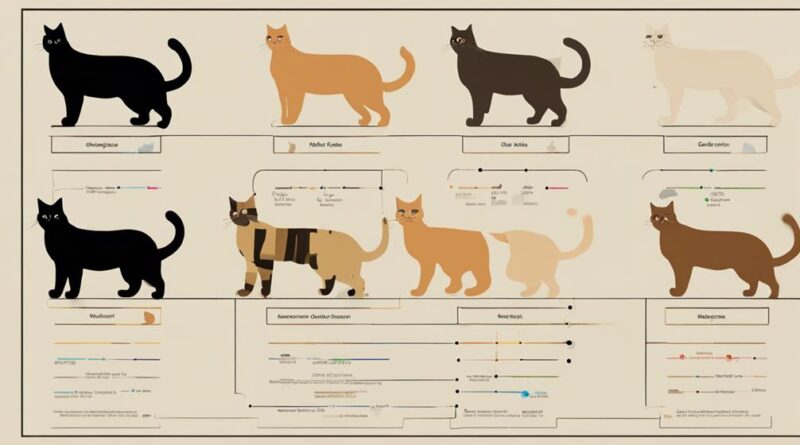Why Do Cat Genetics Influence Their Lifespan?
Have you ever pondered why some cats seem to live longer than others?
The answer lies in their genetics, a complex interplay of inherited traits that can significantly impact their lifespan.
From the color of their fur to their susceptibility to certain diseases, a cat's genetic makeup holds the key to unlocking the mysteries of their longevity.
But how exactly do these genetic factors influence how long a cat can live?
Let's explore the fascinating world of feline genetics and its profound effects on their lifespan.
Genetic Factors Affecting Cat Longevity
Understanding how genes impact a cat's lifespan can shed light on the factors influencing their longevity. Genetic mutations play a significant role in determining the lifespan of a cat. These mutations can occur spontaneously or be inherited from parent cats. In some cases, genetic mutations can lead to health conditions that may affect the cat's lifespan. For example, certain mutations can predispose a cat to develop diseases like heart conditions or cancer, ultimately impacting how long they live.
Hybrid cats, which are bred by crossing two different species or breeds, can also exhibit unique genetic factors that influence their lifespan. The combination of genes from different cat populations can result in hybrid vigor, where the offspring may have enhanced health and longevity compared to purebred cats. However, hybrid cats may also inherit genetic mutations from both parent species, potentially affecting their lifespan in unpredictable ways.
It is essential for cat owners and breeders to be aware of the genetic factors at play when considering the lifespan of their feline companions. By understanding the impact of genetic mutations and the complexities of hybrid genetics, individuals can make informed decisions to promote the health and longevity of their cats. Through responsible breeding practices and regular veterinary care, cat owners can help mitigate the effects of genetic factors on their feline friends' lifespan.
Inherited Health Conditions in Cats
Genetic mutations impacting a cat's lifespan can also manifest as inherited health conditions, presenting challenges for cat owners and breeders to navigate. These mutations can predispose certain breeds to specific hereditary illnesses, affecting the overall feline health risks and potentially shortening their lifespan.
Some common inherited health conditions in cats are hypertrophic cardiomyopathy (HCM), polycystic kidney disease (PKD), and progressive retinal atrophy (PRA). HCM is a heart condition that can lead to heart failure, while PKD causes cysts to form in the kidneys, impacting their function. PRA affects the eyes, leading to vision impairment and blindness. These conditions not only affect the quality of life for cats but also influence their longevity.
Breed-specific genetic mutations can also increase the likelihood of certain health issues. For example, Siamese cats are predisposed to developing asthma, while Maine Coons may be prone to hip dysplasia. Understanding these breed predispositions can help owners and breeders take proactive measures to manage and mitigate the associated feline health risks.
Regular veterinary check-ups, genetic testing, and responsible breeding practices are crucial in addressing inherited health conditions in cats. By staying informed and working closely with veterinarians, cat owners and breeders can help ensure the well-being and longevity of their feline companions.
Impact of Breeding on Cat Lifespan
Breeding practices significantly influence the lifespan of cats, impacting their overall health and longevity. When it comes to cat breeding, certain practices can either enhance or compromise the lifespan of these feline companions. Understanding how breeding choices affect longevity is crucial for promoting healthier cats.
- Breeding practices: The methods and principles used in breeding cats play a vital role in determining their lifespan. Responsible breeding practices, such as avoiding inbreeding and focusing on genetic diversity, can contribute to longer and healthier lives for cats.
- Genetic testing: Conducting genetic tests on breeding cats can help identify potential health issues that may impact the lifespan of their offspring. By screening for hereditary conditions and selecting breeders with favorable genetic profiles, breeders can improve the overall health and longevity of future generations.
- Lifespan: The ultimate goal of considering breeding practices and genetic testing is to increase the lifespan of cats. By prioritizing longevity in breeding decisions, breeders can work towards developing healthier cat populations with extended lifespans.
Understanding Feline Aging Process
Have you ever pondered how cats age and what factors influence their longevity? As cats grow older, they undergo a complex aging process characterized by various cellular changes. Understanding the feline aging process can provide insights into how environmental factors and lifestyle choices impact their lifespan.
The aging process in cats involves gradual alterations at the cellular level. Over time, cells may experience DNA damage, reduced energy production, and a decline in repair mechanisms. These changes can lead to a decrease in organ function and overall vitality as cats age.
Environmental factors play a significant role in influencing how cats age. Exposure to toxins, pollutants, and UV radiation can accelerate the aging process by causing oxidative stress and inflammation in the body. Additionally, lifestyle choices such as diet, exercise, and mental stimulation can either promote healthy aging or contribute to premature aging in cats.
Longevity Markers in Cat DNA
Exploring cat DNA can reveal specific markers associated with longevity, shedding light on factors influencing feline lifespan. Through DNA sequencing, scientists have identified correlations between certain genetic markers and the aging process in cats. These markers play a crucial role in determining how long a cat is likely to live. Here are some key points to consider:
- DNA Sequencing: By conducting thorough DNA sequencing, researchers can pinpoint variations in specific genes that are linked to longer lifespans in cats. This technology allows for a detailed analysis of the genetic makeup of felines, providing valuable insights into longevity markers.
- Lifespan Correlation: The presence or absence of certain genetic markers can significantly impact how cats age. Understanding these correlations can help veterinarians and cat owners take proactive measures to enhance the quality and length of a cat's life.
- Genetic Markers and Aging Process: Genetic markers associated with longevity can influence the aging process in cats. These markers may affect various biological mechanisms that contribute to overall health and lifespan, highlighting the importance of genetic factors in feline longevity.
Genetic Predispositions to Diseases
Uncovering genetic predispositions to diseases in cats provides crucial insights into their susceptibility to various health conditions. Cats, like humans, can inherit genetic mutations that make them more prone to certain diseases. Through genetic testing, veterinarians and researchers can identify these genetic markers, allowing for proactive measures to be taken to mitigate associated health risks.
Certain cat breeds are known to have higher disease susceptibility due to specific genetic mutations. For example, Maine Coon cats have been linked to a genetic predisposition for hypertrophic cardiomyopathy, a common heart disease in felines. By understanding these genetic predispositions, cat owners can work closely with veterinarians to monitor their cat's health and potentially catch any issues early on.
Genetic testing plays a pivotal role in uncovering these predispositions. Through genetic screening, veterinarians can assess a cat's risk for developing certain diseases and tailor preventive care accordingly. This proactive approach can help extend a cat's lifespan and improve their quality of life by addressing potential health issues before they become severe.
Genetic Diversity and Longevity in Cats

How does genetic diversity impact the longevity of cats?
Genetic variation plays a crucial role in determining the lifespan of our feline friends. Here's how it influences the aging process:
- Genetic Variation: Cats with a diverse genetic makeup tend to have a lower risk of inheriting certain genetic diseases that can shorten their lifespan. When a cat's genetic pool is broad, it can lead to a stronger immune system and overall better health outcomes.
- Adaptability to Environmental Changes: Genetic diversity allows cats to be more adaptable to changes in their environment. This adaptability can help them cope better with stressors, diseases, and other factors that may impact their lifespan.
- Longevity Markers: Scientists are continually researching how different genetic variations can act as markers for longevity in cats. By identifying these markers, veterinarians and researchers can develop better strategies to enhance the lifespan of our beloved feline companions.
Enhancing Cat Lifespan Through Genetics
To extend the lifespan of your cat, genetic factors can be harnessed to promote longevity. Genetic modifications play a crucial role in enhancing your cat's lifespan. By selectively breeding cats with favorable genetic traits, such as resistance to common feline diseases or slower aging processes, you can potentially increase their lifespan. Through careful selection of breeding pairs, you can introduce longevity-promoting genes into your cat's genetic makeup, ultimately leading to a longer and healthier life for your feline companion.
Lifespan enhancement through genetics isn't only limited to breeding practices but also extends to advancements in genetic engineering. Scientists are continually researching ways to manipulate genes in cats to combat diseases and slow down the aging process. By introducing beneficial genetic modifications, such as increasing the expression of antioxidant genes or boosting immune system functions, researchers aim to enhance the lifespan of cats and improve their overall well-being.
Frequently Asked Questions
Can Genetic Testing Predict Exactly How Long My Cat Will Live?
Genetic testing can provide valuable insights into your cat's potential lifespan by identifying genetic markers linked to longevity prediction. However, it's important to remember that lifespans can vary due to hereditary factors. While genetic testing can offer some clues, it can't predict exactly how long your cat will live.
Factors like diet, environment, and overall health also play significant roles in determining your cat's lifespan.
Are There Specific Breeds of Cats That Are Known to Live Longer Due to Their Genetics?
Certain cat breeds, through selective breeding, have developed longevity genes that contribute to their extended lifespan. These breeds often exhibit a genetic predisposition towards a slower aging process, leading to longer and healthier lives.
How Do Genetic Factors Interact With Environmental Factors to Influence a Cat's Lifespan?
When it comes to your cat's lifespan, genetic environmental interactions play a crucial role. These factors can lead to lifespan variations among cats.
Your furry friend's genes and the environment they live in can impact how long they live. By understanding how these elements work together, you can help create a healthy and supportive environment for your cat to thrive and potentially live a longer life.
Can Genetic Modifications Be Made to Increase a Cat's Lifespan?
If you're wondering about increasing a cat's lifespan through genetic modifications, it's a complex area. Longevity enhancements through genetic modifications can be a possibility in the future.
Scientists are exploring ways to potentially extend cats' lives by manipulating their genetics. While still in early stages, research shows promise for advancements in feline longevity through genetic modifications.
Stay tuned as advancements in this field continue to evolve.
Are There Any Ethical Concerns Related to Using Genetics to Enhance a Cat's Lifespan?
When it comes to genetic enhancement for cats' longevity research, ethical implications arise. Delving into ways to extend a cat's lifespan through genetic modifications can pose moral dilemmas.
It's essential to consider the consequences and potential risks involved in altering feline genetics for longevity purposes. Balancing the desire to improve cats' lives with ethical considerations is crucial in navigating this complex field of genetic enhancement.
Conclusion
So, next time you wonder why your cat's lifespan is influenced by genetics, remember that inherited health conditions, breeding practices, and genetic predispositions all play a role.
By understanding the genetic factors affecting cat longevity, you can take steps to enhance your feline friend's lifespan. Keep an eye out for longevity markers in their DNA and prioritize genetic diversity to promote a longer and healthier life for your beloved cat.
